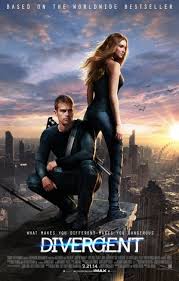Reviewed by Ken Carman for EON

 I just barely caught this one. It’s about to leave our theaters in Nashville.
I just barely caught this one. It’s about to leave our theaters in Nashville.
I was pleased they didn’t get caught up that much in the different factions in this vision of the future, just enough to keep the story rolling. This is one of the major mistakes authors and moviemakers make. Over explaining and getting so specific can kill good fiction easier than a distracted mouse ends up in a cat’s mouth. It encourages the mind to wander.
We don’t need to know the politics of the munchkins to understand Oz.
We don’t need to know the reasons why stormtroopers wore those odd white outfits to enjoy Star Wars.
And we don’t need to know every nuance about every faction in Divergent.
Thank you.
And knowing what lies far beyond the fence that keeps out more of what happened after the Great War is a great teaser, if there ever is a sequel. According to Wiki there will be, but I’ve seen such fall through before.
The story surrounds Beatrice who is perceived as a threat to society because after the Great War thinking for yourself, combined with the ability to think outside the box, are viewed as the ultimate threat to society, especially as first envisioned by Kate Winslet after that horrible night Leonardo left her and became a merman. Now he’s married to a form of sea life. He just acted like he was dead on… porpoise.
Yeah, I’m yanking your chain. (In some circles that qualifies as “kinky.”)
Kate plays Jeanine Matthews who sees “Tris,” as she calls herself now, as an up and coming bright star, or a threat. Probably because of the plan to take over the minds of the policing faction so they’ll exterminate Tris’ original faction because, in part, they’ve been helping divergents.
The story follows logically to a great climax, and the visuals of Chicago after the war are interesting, providing a needed backdrop for that story. They could be a little less CGI, because the damaged part of Chicago looks a bit more “painted” like old SciFi backgrounds. But they’re not the focus anyway. Unlike too many SciFi flicks they don’t get that lost in special effects or visuals. And something else they don’t get lost in: the developing relationship between Tris and a leader of Dauntless, her new faction. It stops at the doorstep: something I appreciate in a day where what once would have been considered soft porn is common place even on TV.
Yes, “appreciated.” I’m no prude, but, once again, that would distract from the storytelling. It would be unnecessary at this point in our story, and needlessly take away from story development in any sequels.
When it comes to the theme it’s a natural. We rarely value most folks who really think out of the box in society, except maybe as fools to steal ideas from and then mock. The concept that tendency could develop: for whatever reason, into an oppressive society, one far more oppressive than now, is no gigantic stretch.
Good for all screens, but better on the big screen.
A solid 4.




Welcome to Our End of the New movie reviews. One poster: don’t bother. Two posters: eh, OK, but a lot of problems here. Three: Good movie, just at least one problem. Four: very good. Five: if you don’t go you’re missing out. Added comments at the end: “you could wait for it to come on TV,” “best seen on the big screen” and “good for all screens,” unless other comments are added, refer mainly to the nature of the movie such as special effects, incredible sound or scenery that might make it best seen in a movie theater depending on your set up at home.
